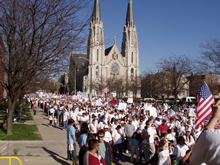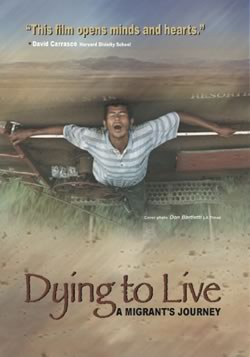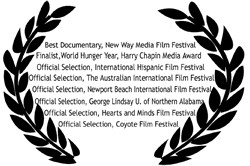Catholic Perspectives
Catholic social teaching affirms the family, not the isolated individual, as the basic unit of society. If this emphasis on the family were taken as a fundamental principle in forming immigration policy, what changes in policy would ensue?

Indianapolis demonstration photo courtesy of Institute for Latino Studies.
A Church Perspective
 "...a mutual openness will bring enrichment to all."
"...a mutual openness will bring enrichment to all."
"In its history, America has experienced many immigrations, as waves of men and women came to its various regions in the hope of a better future. The phenomenon continues even today, especially with many people and families from Latin American countries who have moved to the northern parts of the continent, to the point where in some cases they constitute a substantial part of the population. They often bring with them a cultural and religious heritage which is rich in Christian elements. The Church is well aware of the problems created by this situation and is committed to spare no effort in developing her own pastoral strategy among these immigrant people, in order to help them settle in their new land and to foster a welcoming attitude among the local population, in the belief that a mutual openness will bring enrichment to all."
Pope John Paul II
Ecclesia in America, #65
Films from the Catholic Perspective
“Jesus himself was a migrant.”University of Notre Dame Theologian Rev. Daniel Groody, C.S.C., assistant professor of theology at Notre Dame, director of the Center for Latino Spirituality and Culture at the Center for Latino Studies
Watch the video: Dying to Live: A Migrant’s Journey

This is the true face of the Mexican immigrant experience, according to Father Daniel Groody.
Dying to Live is a profound look at the human face of the immigrant. It explores who these people are, why they leave their homes and what they face in their journey. Drawing on the insights of Pulitzer Prize winning photographers, theologians, Church and congressional leaders, activists, musicians and the immigrants themselves, this film exposes the places of conflict, pain and hope along the US-Mexico border.
It is a reflection on the human struggle for a more dignified life and the search to find God in the midst of that struggle. This film builds on U.S. bishops’ immigration campaign and was used nationwide as an educational tool to discuss the Church and immigration. Order the film

Watch the video: Strangers No Longer
Designed to expose audiences to current immigration realities, the film Strangers No Longer highlights Catholic social teaching on migration and the Church’s perspective on what changes are necessary. Strangers No Longer will be used nationwide as an educational tool to discuss the Church and immigration, as was "Dying to Live: A Migrant’s Journey," released by Father Groody in 2005.
Produced by Groody River Films and the Catholic Communication Campaign of the U.S. Bishops’ Justice for Immigrants Campaign, the film is Groody’s second immigration documentary, and it builds on the U.S. Catholic Bishops’ immigration statement, influencing people’s understanding of immigrants from a Catholic perspective.
“I think one of the most powerful ways we can be Catholic is to be hospitable,” Father Groody said. “And when we are, we create a community of love and civilization that reflects God’s love for the world.” Read More
Rev. Daniel G. Groody, C.S.C.
 Daniel G. Groody is a Catholic priest, a Holy Cross religious, teacher, and film producer. He is currently an Assistant Professor of Theology and the Director of the Center for Latino Spirituality and Culture at the Institute for Latino Studies at the University of Notre Dame.
Daniel G. Groody is a Catholic priest, a Holy Cross religious, teacher, and film producer. He is currently an Assistant Professor of Theology and the Director of the Center for Latino Spirituality and Culture at the Institute for Latino Studies at the University of Notre Dame.
A scholar who frequently writes on the emotional and spiritual challenges faced by illegal immigrants, Groody has been studying Mexican immigration for more than 15 years.
He spent many years working in Latin America, particularly along the U.S.- Mexico Border, and is the author and editor of various books and articles which have been translated into five languages, including Border of Death, Valley of Life: An Immigrant Journey of Heart and Spirit (2002); Globalization, Spirituality and Justice: Navigating the Path to Peace (2007); The Option for the Poor in Christian Theology (2007), and A Promised Land, A Perilous Journey: Theological Perspectives on Migration (co-edited with Gioacchino Campese, 2007).
For 2007-2008 he will be a visiting research fellow at Oxford University at the Oxford Refugee Centre.
